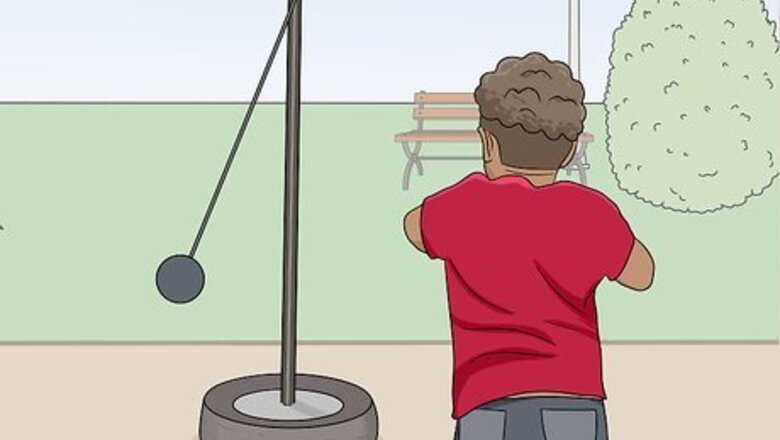
views
X
Research source
[2]
X
Research source
Bancroft, Jessie H. (1922). Games for the Playground, Home, School and Gymnasium. Macmillan Company, New York. pp. 409–411.
This simple, low maintenance game is a great workout, and with a little know-how and an understanding of the rules, you can soon enjoy playing tetherball yourself.
Familiarizing Yourself with Rules
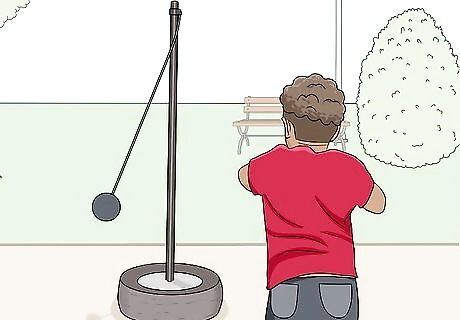
Know your goal. The equipment for tetherball is relatively simple. Each court is composed of a ball on a rope attached to a ten-foot pole. The court is divided into two sides, one for each player, that should evenly divide the pole in half. Your goal when playing tetherball is to hit the ball with your hand in a way that gets it past your opponent so that the rope winds completely around the tetherball pole.
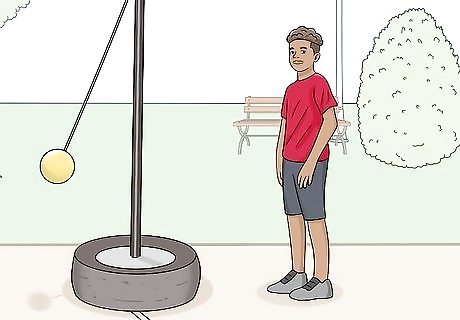
Stay on your side. The tetherball court is divided in half and is usually marked off by chalk or a line in the cement. If there are no markers for the side boundaries, be sure to ask other players. You will be expected to stay on your side of the court while facing your opponent. Going off-sides will result in the offending player getting a penalty.
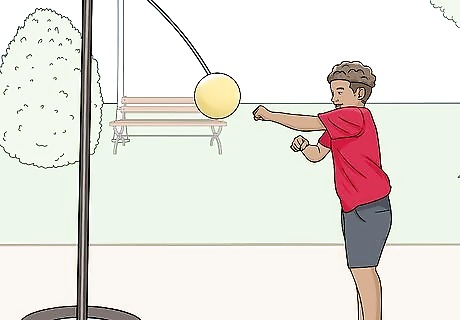
Use your hands. Opposite of soccer rules, tetherball requires you to only touch the ball with your hands. Touching the ball with another part of your body can result in a penalty against you. Open, closed, or double handed strikes are allowed - use what works best for you! A popular house rule, sometimes called "beach tetherball," allows for the use of any part of the body during play.
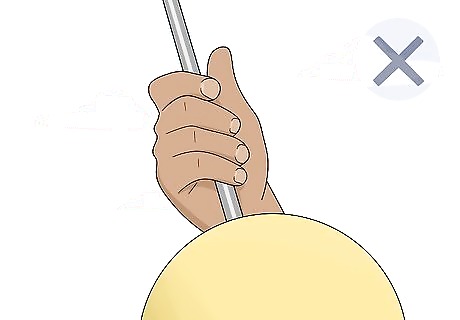
Avoid touching the rope or pole. Using the rope, a player can launch the ball in a way that makes it difficult for opposing players to return. This is why touching the rope is considered an illegal move. Touching the tetherball pole is also illegal and will result in the immediate loss of the game for the player who touched it. A common house rule allows players to hold the rope where it meets the ball only when serving.
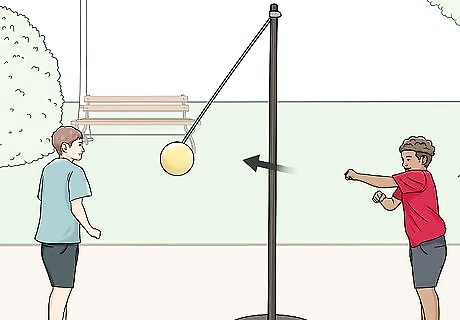
Strike the ball to return it to your opponent. This might seem obvious, but violating this rule can be tempting. By holding the ball for a split second, you can redirect it out of the reach of your opponent, which is illegal and referred to as "carrying." All contact between you and the ball should result in it bouncing off your hands right away, otherwise it is considered a rule violation. Unless a house rule says otherwise, serves must also be hit and not thrown or "carried."
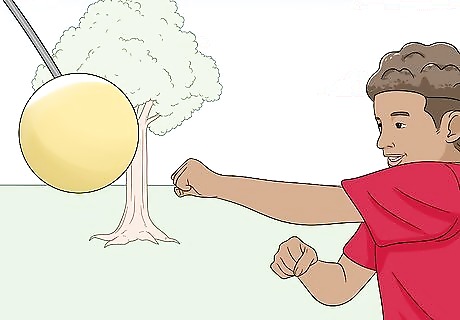
Make your hits count. Each time the ball crosses onto your side of the court, you are allowed a single hit. The one exception to this rule are rebounds off the pole. If the ball hits the pole and returns to a player, the player may hit the ball again as though it were his first hit. Hitting the ball more than once is often called "juggling." Each time the ball passes the boundary line or bounces off the pole, the hit counter is reset to zero. Hitting more the once will result in a penalty.
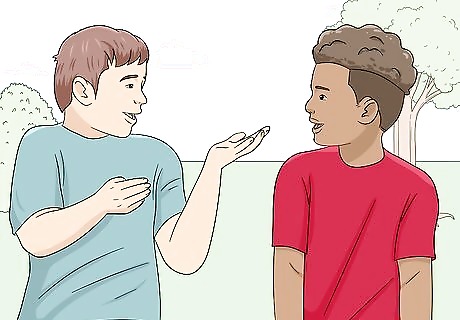
Ask other players about house rules. Because of the fact that tetherball is an informal game, there may be special rules, called "house rules," that you'll need to take into account while playing. These rules might be slight variations on rules you are already familiar with, but by asking for the house rules up front, you'll prevent yourself from getting an unnecessary penalty.
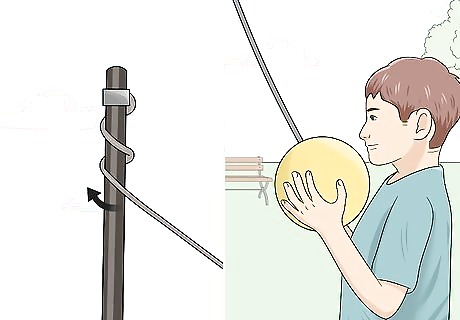
Award penalties for breaking the rules. Whenever a player breaks the rules, play should be stopped immediately and the ball returned to its position when the violation occurred. This includes the number of wraps; wraps around the pole gained from violations should be unwound. Additionally: Possession of the ball goes to the player who did not break the rules. This player should then serve the ball. Three rule violations results in an immediate loss for the rule breaking player. Some house rules allow an extra wrap in favor of the player who did not break the rules.
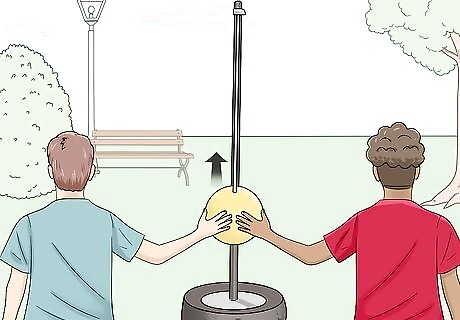
Pole drop the tetherball for double violations. When both players commit a violation of the rules, a pole drop will decide play. This is where both player hold the tetherball with a single hand over the boundary line about three feet ( .91 m) away from the pole. Both players then drop the ball and after the ball hits the pole, game play resumes.
Playing Tetherball
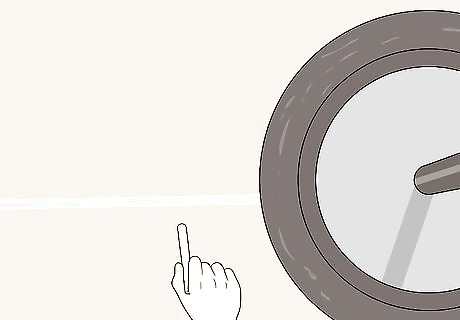
Mark your boundaries. Having poorly marked or unclear boundaries can result in arguments as to whether or not someone stepped off-sides. Keep this from happening clearly marking boundaries with clear lines drawn in the dirt, gravel, or on the cement with a piece of chalk.
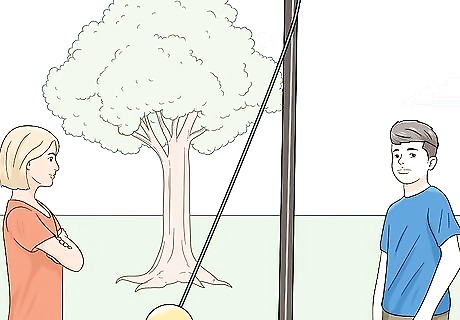
Take your position opposite your opponent. You'll also have to decide which player will serve first. The victor of the previous game is typically allowed the first serve, however if there was no previous game, you might select the serving player with a coin toss. The direction of the first serve is always the decided by the player returning the serve.
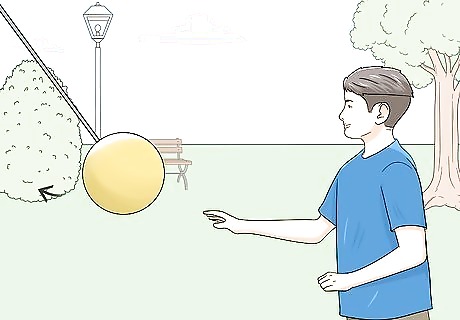
Serve or return the ball. The game begins when one player serves the ball, usually by holding it in one hand and hitting it with the other. You might try a punching motion, as this can pop the ball outside the reach of your opponent.
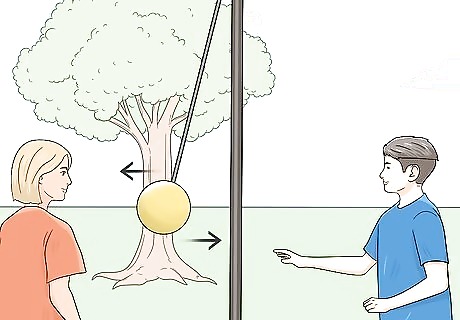
Hit the ball back and forth. Each player should try to hit the ball, one clockwise, and the other counterclockwise. It is generally acceptable to hit the ball with either the fist or the open hand, but be sure you don't "carry" the ball when using an open handed strike.
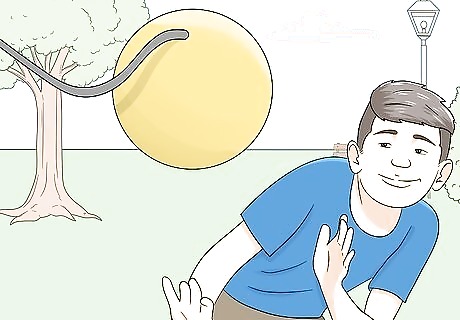
Fake out opponents with strategy and variety. There is no rule in tetherball stating that you must hit the ball, so you might allow the ball to zoom past you intentionally to throw off your opponent. You can also hit the ball in the same direction as your opponent, sometimes sneaking it by him and giving you a better position to strike the ball out of his reach. To trick your opponent, you also might: Pop slower balls over the head of your opponent by lightly punching the ball upwards with your knuckles. Hit the ball lightly when your opponent expects a harder return.
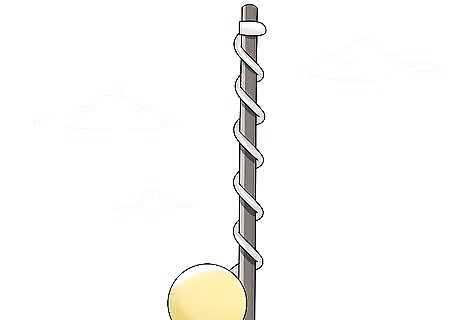
Play until the victor is decided. When one player manages to wind the ball all the way around the pole so that it can be wound no farther, the game ends. A match can consist of one, three, five, or more games depending on house rules. In some versions of the game, the ball must strike the pole with the final wrap above a height goal marked on the pole, generally a five-foot (1½ m) high mark. A height goal lower than five feet (1½ m) can be used for younger players. If you want to mark a height goal for your tetherball set, consider using some colored electrical tape.
















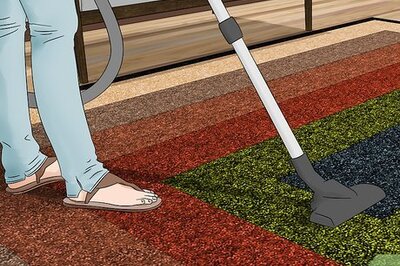

Comments
0 comment